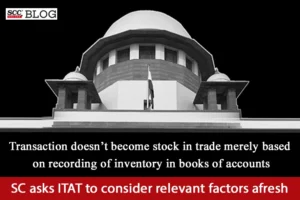Supreme Court: In a civil appeal filed by Revenue against the impugned judgment and order passed by the Bombay High Court, wherein the Court dismissed the appeal preferred by Revenue, by which the addition made by the Assessing Officer (‘AO’) of Rs. 15,94,06,500/- was deleted, thereby confirming the order by ITAT, the division bench M.R. Shah* and B.V. Nagarathna JJ. has viewed that the Income Tax Appellate Tribunal (‘ITAT’) has not considered the relevant aspects/relevant factors while considering the transaction in question as stock in trade and has not considered the relevant aspects which were required to be considered by the ITAT. The High Court has also failed to appreciate that even in the event of acceptance of claims made by the assessee, including the assertion that Rs. 15,94,06,500/- was shown in the tax return in the earlier Assessment Year i.e., 2008-20-09.
Thus, the Bench remanded the matter to ITAT to consider the appeal afresh and to take into consideration the relevant factors while considering the transaction as stock in trade or as sale of capital assets or business transaction.
Background:
In the case at hand, the dispute pertains to the Assessment Year 2009-2010 i.e., Financial Year 2008-2009. The assessee entered into an agreement with Kirit City Homes Pvt. Ltd. The development rights in a property at Vasai were sold for a total consideration of Rs. 15,94,06,500/-. It appears that as per the development agreement and as per the receipt of the deed, consideration of Rs. 15,94,06,500/- was agreed and received by the assessee. During assessment, it was noticed by the AO that the aforesaid was not disclosed while filing the return of income. The assessee did not enter the aforesaid income into his profit and loss account. The assessee was asked to explain the transaction as it was not appearing in its profit and loss account.
The assessee replied to the same and with regard to the applicability of provision of Section 50-C of the Income Tax Act, 1961 the assessee stated that the assessee had sold its stock in trade and not the assets. The AO made the addition of Rs. 15,94,06,500/- by treating the same as short term capital gains and consequently, added the same to the income for the year under consideration.
The AO treated the transaction as capital assets. The ITAT has reversed the said findings and held that the transaction was stock in trade.The AO specifically recorded the findings on examining the balance sheets for the Assessment year 2006-20-07 to 2009-2010 that there was not even a single sale during all these years and that there were negligible expenses and the transaction in question was the only transaction i.e., transfer of development rights in respect of land and consequently, it was held that the transaction was one of transfer of capital assets and not one of transfer of stock in trade.
However, the ITAT after examining the opening and closing balance for the Assessment year 1996-1997 to 2007-20-08 observed that in multiple years, inventory was shown in the balance sheet, without discussing the claim of the assessee and held that the transaction in question is sale of stock in trade.
Analysis:
The Court said that ITAT has neither dealt with the findings given by the AO nor verified/examined the total sales made by the assessee during the relevant time and during the previous years. Merely based on recording of the inventory in the books of accounts, the transaction in question would not become stock in trade.
The Court reiterated that to examine whether a particular transaction is sale of capital assets or business expense, multiple factors like frequency of trade and volume of trade, nature of transaction over the years etc., are required to be examined.
Further, it said that from the order passed by the ITAT, it appears that the ITAT has without examining any of the relevant factors confirmed that the transaction was transfer of stock in trade.The High Court has also failed to appreciate that even in the event of acceptance of claim made by the assessee, including the assertion that Rs. 15,94,06,500/- was shown in the tax return in the earlier Assessment Year i.e., 2008-20-09. The differential amount of Rs. 10,69,79,146/- on account of reduction in sale consideration of development rights was to be assessed in the current year as either capital gain or business income.
The Court noted that as per the claim of the assessee and the entry made and reflected in the ledger account of the assessee as on 31-03-2008, an amount of Rs. 15,94,06,500/- was paid to a third party. However, thereafter, according to the assessee there was a rectification deed dated 30-05-2008 and the amount was reduced from Rs. 15,94,06,500/- to Rs. 5,24,27,354/-.
The Bench said that ITAT has not even questioned the factum of refund of differential amount of Rs.10,69,79,146/- to the purchaser on account of rectification deed. The ITAT ought to have appreciated that the moment the receipt of amount is received and recorded in the books of accounts of the assessee unless shown to be refunded/returned, it is to be treated as income in the hands of the recipient. However, the ITAT has also not considered the aforesaid aspect.
The Court viewed that the ITAT has not considered the relevant aspects/relevant factors while considering the transaction in question as stock in trade, which were required to be considered by the ITAT.
Thus, the Bench remanded the matter to ITAT to consider the appeal afresh and to take into consideration the relevant factors while considering the transaction as stock in trade or as sale of capital assets or business transaction.
Thus, the Court quashed the impugned judgment and order passed by the High Court and the ITAT.
[CIT v. Glowshine Builders & Developers (P) Ltd., 2023 SCC OnLine SC 571, decided on 04-05-2023]
*Judgment Authored by: Justice MR Shah

